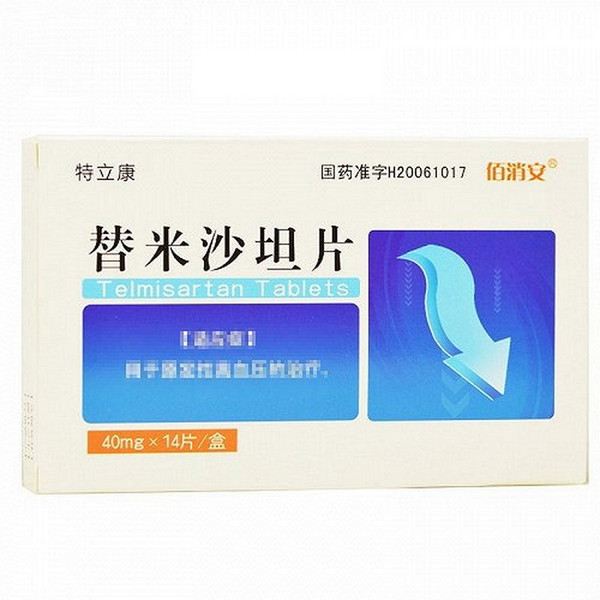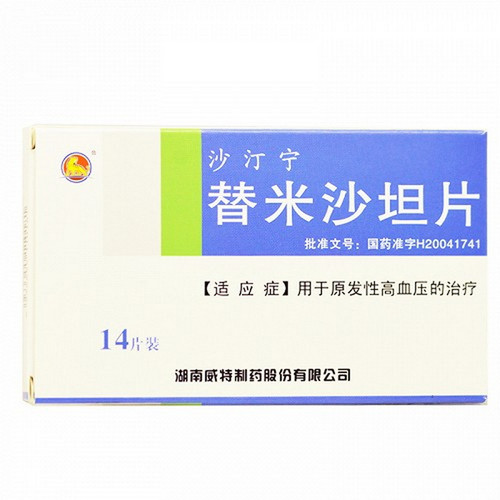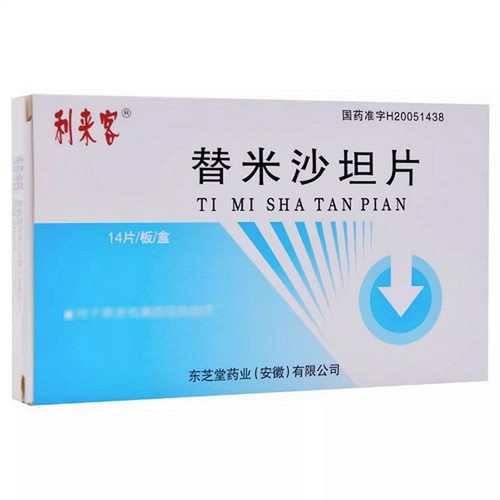Product Overview
[Drug Name]
Generic Name: Telmisartan Tablets
Trade Name: TeLiKang Telmisartan Tablets 40mg*14 Tablets
Pinyin Full Code: TeLiKang TiMiShaTanPian 40mg*14 Tablets
[Main Ingredient]
Telmisartan.
[Appearance]
This product is white or off-white tablets.
[Indications/Main Function]
For the treatment of essential hypertension.
[Precautions]
Hepatic Insufficiency: This product should not be used in patients with cholestasis, biliary obstructive disease, or severe hepatic dysfunction, as telmisartan is largely excreted via bile, and clearance of this product may be reduced in these patients. This product should be used with caution in patients with mild to moderate hepatic impairment. Renovascular Hypertension: In patients with bilateral renal artery stenosis or unilateral renal artery stenosis of a functioning kidney, the risk of severe hypotension and renal insufficiency may be increased with the use of drugs that affect the renin-angiotensin-aldosterone system. Renal Impairment and Renal Transplant Patients: This product should not be used in patients with severe renal impairment (creatinine clearance <30 mL/minute, see Contraindications). For patients with renal impairment, serum potassium and creatinine levels should be monitored regularly during use of this product. There are no data on the use of this product in patients shortly after a recent renal transplant. Patients with Volume Depletion: This product may cause symptomatic hypotension in patients with volume depletion or hyponatremia due to strong diuretic therapy, salt restriction, nausea, or vomiting, particularly after the first dose. Therefore, serum sodium and volume levels should be corrected before using this product. Other Conditions Related to Stimulation of the Renin-Angiotensin-Aldosterone System: In patients whose vascular tone and renal function depend primarily on the activity of the renin-angiotensin-aldosterone system (e.g., patients with severe congestive heart failure or underlying renal disease including renal artery stenosis), the use of medicinal products that affect this system may cause acute hypotension, hyperazotemia, oliguria, or rarely, acute renal failure. Primary Aldosteronism: Antihypertensive drugs that inhibit the renin-angiotensin-aldosterone system are generally ineffective in patients with primary aldosteronism, so this drug is not recommended for use in these patients. Aortic or mitral stenosis, obstructive hypertrophic cardiomyopathy: As with other vasodilators, this drug should be used with caution in patients with aortic or mitral stenosis, or obstructive hypertrophic cardiomyopathy. Electrolyte Imbalance: Hyperkalemia: Use of drugs that affect the renin-angiotensin-aldosterone system may cause hyperkalemia, particularly in patients with renal impairment and/or heart failure, and diabetes mellitus. However, for patients at risk, serum potassium levels should be closely monitored while taking this drug. Based on experience with other drugs that affect the renin-angiotensin system, concomitant use of this drug with potassium-sparing diuretics, potassium supplements, potassium-containing salt substitutes, or other drugs that increase serum potassium levels (such as heparin) may increase serum potassium levels. Therefore, caution should be exercised when using this drug with this drug (see Drug Interactions). Other: Similar to angiotensin-converting enzyme inhibitors, the antihypertensive effect of this medication and other angiotensin antagonists is lower in blacks than in other ethnic groups. This may be related to the higher prevalence of low renin status in hypertensive individuals in blacks. As with other antihypertensive drugs, excessive blood pressure reduction can cause myocardial infarction or stroke in patients with ischemic heart disease or ischemic cardiovascular disease. Effects on Driving and Operating Machinery: The effects of this medication on driving and operating machinery have not been studied. However, caution is advised when driving and operating machinery, as antihypertensive therapy can sometimes cause dizziness and drowsiness. Diabetic Patients: Patients with diabetes and additional cardiovascular risk factors, such as diabetic coronary artery disease (CAD), may be at increased risk of fatal myocardial infarction and death other than cardiovascular disease when using antihypertensive medications such as angiotensin receptor blockers or ACE inhibitors. CAD may be undiagnosed in patients with diabetes and CAD due to asymptomatic conditions. Therefore, before using this medication, diabetic patients should undergo appropriate diagnostic evaluation, such as exercise testing, to detect CAD and initiate appropriate treatment.
[Drug Interactions]
◆ Hypersensitivity to the active ingredient or any of the excipients of this product; ◆ Mid- to late-pregnancy and breastfeeding women; ◆ Patients with biliary obstructive disease; ◆ Patients with severe hepatic insufficiency; ◆ Patients with severe renal insufficiency (creatinine clearance <30 ml/min)
[Specifications]
40mg*14 tablets
[Dosage and Administration]
Adults: Dosing should be individualized. The usual initial dose is one tablet (40 mg) once daily. Telmisartan's antihypertensive effect is dose-dependent within the 20mg to 80mg dose range. If optimal blood pressure is not achieved after treatment, the dose can be increased, up to a maximum of 80mg once daily. This product can be used in combination with thiazide diuretics, such as hydrochlorothiazide, which have a synergistic antihypertensive effect. Since telmisartan does not reach its maximum effect four to eight weeks after the start of treatment, this should be considered when increasing the dose. Patients with Renal Impairment: No dose adjustment is required for patients with mild or moderate renal impairment. Telmisartan is not cleared by hemofiltration. Patients with Hepatic Impairment: The daily dose of this drug should not exceed 40 mg for patients with mild or moderate hepatic impairment. Elderly: No dose adjustment is required for this drug. Children and Adolescents: Safety and efficacy data for this drug have not been established in children and adolescents under 18 years of age.
[Adverse Reactions]
In placebo-controlled trials, the overall incidence of adverse events was similar with telmisartan (41.4%) and placebo (43.9%). The incidence of adverse events was not dose-related and was not associated with gender, age, or race. The adverse reactions listed below are cumulatively reported in 5,788 hypertensive patients treated with telmisartan in clinical trials. Adverse reactions are classified by frequency as follows: Very common (>1/10); Common (>1/100, <1/10); Uncommon (>1/1000, <1/100); Rare (>1/10000, <1/1000); Very rare (<1/10000) Systemic reactions: Common: back pain (such as sciatica), chest pain, flu-like symptoms, symptoms of infection (such as urinary tract infection including cystitis) Uncommon: visual abnormalities, sweating Rare: Angioedema (with fatal consequences) Rare: Hypoglycemia (rarely in patients with diabetes) Rare: Pain in the extremities (leg pain) Central and peripheral nervous system: Common: dizziness Gastrointestinal system: Common: abdominal pain, diarrhea, indigestion, gastrointestinal dysfunction; Rare: dry mouth, flatulence Musculoskeletal system: Common: joint pain, leg cramps or leg pain, myalgia; Rare: tenosynovitis-like symptoms Psychiatric system: rare: anxiety Respiratory system: common: upper respiratory tract infection including pharyngitis and rhinitis Skin and appendage system: common: skin abnormalities such as eczema In addition, since the launch of telmisartan, individual case reports have reported the occurrence of erythema, itching, syncope, insomnia, depression, stomach discomfort, vomiting, hypotension, bradycardia, tachycardia, dyspnea, eosinophilia, thrombocytopenia, weakness, and decreased work efficiency. Similar to other angiotensin II antagonists, angioedema, urticaria and other related adverse reactions have been reported in very few cases. Laboratory findings: Compared with placebo, a decrease in hemoglobin or an increase in uric acid was occasionally found in the telmisartan treatment group. The increase in blood creatinine or liver enzymes was similar to or lower than that of placebo in the telmisartan group. Unclear: sepsis including fatal outcomes [1] [1] In the PRoFESS study, the incidence of sepsis was increased in telmisartan compared with placebo, which may be a result of chance or may be related to a currently unknown mechanism.
[Contraindications]
◆ Hypersensitivity to the active ingredient or any of the excipients of this product; ◆ Pregnant women in their second or third trimester or breastfeeding women; ◆ Patients with biliary obstructive disease; ◆ Patients with severe hepatic insufficiency; ◆ Patients with severe renal impairment (creatinine clearance < 30 ml/min);







